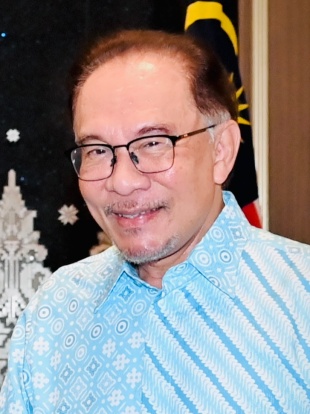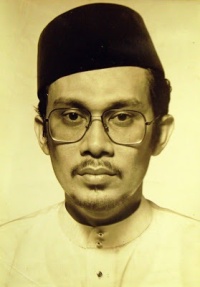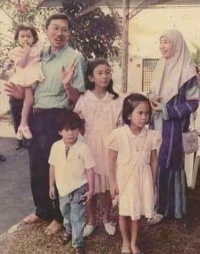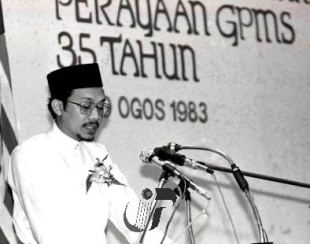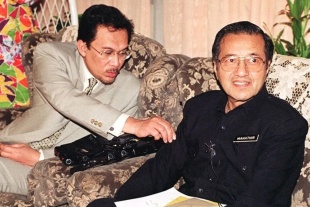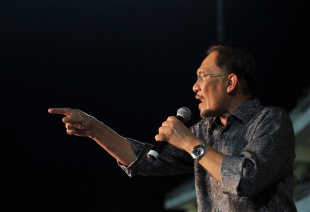ANWAR IBRAHIM
One of the most well-known politicians in Malaysia is Prime Minister Anwar Ibrahim. A former student radical and author a book on philosophy called “The Asian Renaissance”, he was anointed by Mahathir as his successor and was his deputy prime minister Mahathir had originally planned to step down in 1998 paving the way for Anwar to succeed him but things started to go wrong after the Asian economic crisis in 1997-98.
Paul Wolfowitz wrote in Time, “During the 1990s, Malaysian Deputy Prime Minister Anwar Ibrahim and a group of U.S. Senators organized a forum to exchange views among East Asians and Americans. Asked at one session about the role of Islam in politics, Anwar replied, "I have no use for governments which call themselves Islamic and then deny basic rights to half their population." This devout Muslim leader was an impressive and eloquent advocate of tolerance, democracy and human rights. So we were shocked by his arrest and trial in 1998 on charges of corruption and sodomy. I felt his real "crime" had been to challenge Prime Minister Mahathir Mohamad, whose impressive record will be forever stained by his treatment of Anwar. When he was finally released from prison in 2004, U.S. policy on Iraq was unpopular in Malaysia, and Anwar was harshly critical. It would have been easy for him to disown our friendship, but he is not that kind of person. He kept the channels of dialogue open, even while making clear our disagreements. [Source: Paul Wolfowitz, Time, May 12, 2008, Wolfowitz is a former U.S. Deputy Secretary of Defense /-/]
“Anwar, 60, is back in the center of Malaysian politics. The coalition led by his wife Wan Azizah has become the main opposition bloc. His future role can be determined only by Malaysians. One can hope that they will embrace his brand of tolerance, valuing dialogue across political differences, and that this courageous leader will continue to play a leading role on the world stage. /-/
RELATED ARTICLES:
ANWAR IBRAHIM'S TRIALS, LEGAL PROBLEMS AND TIME IN JAIL factsanddetails.com
ANWAR IBRAHIM FINALLY BECOMES PRIME MINISTER factsanddetails.com
NAJIB RAZAK: LIFE, POLITICAL CAREER, SCANDALS factsanddetails.com
MALAYSIA UNDER PRIME MINISTER NAJIB RAZAK 2009-2018 factsanddetails.com
1MDB SCANDAL: BILLIONS, BIRKIN BAGS, CELEBRITIES, JHO LOW, JAILTIME FOR NAJIB factsanddetails.com
MAHATHIR MOHAMAD: HIS LIFE, VIEWS, CHARACTERS, OUTRAGEOUS STATEMENTS factsanddetails.com
MALAYSIA UNDER MAHATHIR MOHAMAD factsanddetails.com
ASIAN FINANCIAL CRISIS OF 1997-98 IN MALAYSIA factsanddetails.com
RISE OF MODERN MALAYSIA 1963-1990: DEVELOPMENT, ECONOMICS, POLITICS factsanddetails.com
ELECTIONS IN MALAYSIA factsanddetails.com
POLITICS IN MALAYSIA: LEADERS, ETHNICITY, RELIGION, SYMBOLS, PROTESTS factsanddetails.com
POLITICAL PARTIES IN MALAYSIA factsanddetails.com
Anwar's Early Life
The son of rubber plantation workers and rice farmers, Anwar was born on August 10, 1947 and brought up in a village house without running water and electricity. He was known as studious child who never missed his prayers. Anwar attend Malay College in the northern town of Kuala Kangsar, one of Malaysia's top schools, where was exposed to Western learning and he earned a reputation as a firebrand Islamic youth leader. He said he war inspired by John F. Kennedy, Che Guevara, and Zhou Enlai. Anwar was married in 1979 to Wan Azizah, an opthamologist trained in Ireland, as part of an arranged marriage set up in part by their parents. Anwar and Azizah have six children, aged 6 to 19 in 1999.
Anwar has a reputation of being suave and articulate. Regarded as both an Islamic activist and a Western-influenced liberal, he doesn't drink alcohol and prays five times but is well versed in Western literature and political thought. He is just as comfortable quoting from Confucius, de Tocqueville, Gabriel Garcia Marquez, and Shakespeare as his he is from the Koran. He doesn't advocate that women wear veils or limbs be chopped off as punishment.
Anwar was president of the Malaysian Muslim Students Union in university. Ian Buruma wrote in The New Yorker, in the 1970s, Anwar and Dr Mahathir steadily gained influence. By 1981, Dr Mahathir was prime minister. A year later, Anwar, who could easily have joined PAS, was brought into the government to help put Dr Mahathir’s ethnic theories into practice through the so-called New Economic Policy. He continued to do so until the late 1990s, when the consequences had become too blatant to ignore.”
Anwar’s Family and Interests
Anwar is an ethnic Malay and Muslim who married Wan Azizah Wan Ismail on February 26, 1980. They have five daughters and a son. His wife was often in media speaking up for Anwar when he was imprisoned and on trial. At the general election in 2022, his eldest daughter, Nurul Izzah Anwar, failed to retain her position as the MP for Permatang Pauh. [Source: Wikipedia]
During his trials and time in prison in the 2000s, Anwar was placed in solitary confinement and was beaten frequently, requiring surgery in Germany after his release. He once appeared in court with a black eye. Anwar has expressed interest in the works of William Shakespeare and said he read his complete works four and a half times while imprisoned. He presented a paper at the 2006 World Shakespeare Congress. In prison, he said he survived by singing and reading.
Anwar’s daughter, Nurul Izzah, was elected as a member of Parliament for PKR in 2008 when she was 27. Fresh from giving birth, she joined her mother in contesting the March 8 elections, running in the multiracial Lembah Pantai constituency in Kuala Lumpur. She emphasized that she was running on her own merit, aiming to promote a politics free of racial division. Some voters saw her as promising due to her education and religious commitment, while analysts noted she faced tough competition. [Source: Ahmad Pathoni, Reuters, February 28, 2008; Ian Buruma, The New Yorker, May 19, 2009]
Ian Buruma, The New Yorker noted that Nurul Izzah, though initially reluctant to enter politics, became politically active when her father Anwar was imprisoned. Popular among young voters, she combines public speaking skills, charisma, and advocacy for multiracial politics. Educated in the U.S. and having studied international relations at Johns Hopkins, she embraces her Muslim identity while advocating liberal, democratic values. [Sources: Reuters; Ian Buruma, The New Yorker]
Anwar's Early Political Career
At Malaya University in Kuala Lumpur, Anwar pushed for road signs to be changed from English to Bahasa and founded the pro-Islamic Malaysian Youth Movement. He was jailed without a trial for 22 months in 1974 under the Internal Security Act for leading anti-government demonstration intended to bring attention to poverty in the north. In 1979, Anwar was one of the first foreigners to visit Iran and congratulate the Ayatollah Khomeini. Anwar later said the Ayatollah was "very polite though you couldn't engage him."
Mahathir was Anwar's mentor. Anwar visited Mahathir in 1970s when he was exiled. Anwar sort of bullied his way into the HMNO by making moves to join the Islamic PAS party. Mahathir put Anwar on the fast track. Anwar served as the ministers of Culture, Youth and Sports in 1983, Agriculture un 1968, Education and finally Finance in 1991. In 1993, Anwar was made Deputy Prime Minister after organizing his supporters within the HMNO in such as way that Mahathir had little choice but to appoint him. Ian Buruma wrote in The New Yorker, “He was poised to succeed Prime Minister Tun Dr Mahathir Mohamad. And then he got overconfident.”
Mahathir and Anwar lived side by side. Mahathir had such faith in Anwar’s ability that he let him lead the country for two months in 1997 while he took a two-month extended vacation. During those two months, Anwar passes tough anti-corruption legislation, raised questions about the $6 billion Bakun dam project and created Peace Corps-like organization. Anwar was in office when the Thai currency crisis happened. When Mahathir returned he reversed many of Anwar’s policies.
Falling Out Between Anwar and Mahathir
After the Asian economic crisis in 1997-98 Anwar and Mahathir had a falling out over how the country should deal with the crisis. Anwar was friendly with international financiers and he promoted the International Monetary Fund’s prescription of reducing government spending and eneacting tight monetary policies. Mahathir accused him selling out to foreign interests and chose to blame foreign currency traders for the crisis.
At that time it seemed as if the two men differed on almost very issue, especially economic ones.. After a coup in Cambodia, for example, Mahathir criticized efforts by Western human rights advocates while Anwar said it was time for Southeast Asia to create a sort of peace keeping force there. The fall of Suharto in May 1998 gave Anwar and his supporters courage to speak out more openly and brazenly against the government. Anwar accused Mahathir of cronyism.
Ian Buruma wrote in The New Yorker, “Starting in the summer of 1997, when the Malaysian currency and stock market lost more than half of their value in the Asian financial meltdown, Anwar did something that Dr Mahathir found unforgivable. Even as the prime minister was imposing capital controls and blaming “rogue speculators,” such as George Soros, for the crisis, Anwar launched an attack on “nepotism” and “cronyism” in his own party, UMNO, which had been in power since independence. The “cronies” included members of Dr Mahathir’s family. While Dr Mahathir tried to bail out banks and corporations run by his allies, Anwar talked about transparency and accepting some of the International Monetary Fund’s recommendations for liberalising the economy. Dr Mahathir does not like to be contradicted. In 1998, Anwar was removed from the Cabinet and from UMNO. [Source: Ian Buruma, The New Yorker, May 19, 2009]
On September 2, 1998, Anwar was asked to resign deputy prime minister. He refused and was sacked. Hours after he was dismissed, Anwar railed the Mahathir government, saying, "I was not ready to resign because I had repeatedly said that there was a conspiracy at the highest level to see my downfall."
Support for Anwar and the Launching of the Reformasi Movement
In September 1998, Anwar was arrested after leading an anti-government demonstration with 30,000 people and charged with sodomy and corruption. Mahathir said, "I cannot accept a man who is a sodomist to become the leader of this country." In April 1999, Anwar was found guilty of four corruption charges and sentenced to six years in prison for corruption. In September 2004, Anwar was released from prison.
The arrest of Anwar triggered demonstrations for “Reformasi” (“Reform”) by Anwar's supporters, mostly students and young people. While Queen Elizabeth was visiting Malaysia in September 1998, demonstrations were broken up with water cannons that fired a fluid that "stung the eyes, choked the throat and hung in the air for half-an-hour," according to the Independent.
After the verdict from the trial was read riots broke out in Kuala Lumpur in which angry demonstrators called for Mahathir’s ouster. hurled rocks at police, set bonfires, smashed car windows and overturned garbage cans. Police fired tea gas, used water cannons and doused demonstrators with a smelly yellow liquid. One activist, who was beaten badly by police, told AP, "They kicked my head and body and whacked stomach. They just went crazy." In other demonstration that followed, the police cracked down equally hard.
Amnesty International and 14 other human rights organizations issued a statements that read: "The unsubstantiated affidavits, vague insinuations of treason and other nebulous accusations that have been presented through the media without right of reply are unacceptable...The total lack of transparency in this episode is a reflection of the utter contempt and disregard that the Prime Minister has for the people of his country."
The Reformasi movement brought together student liberals and members of the Islamic PAS party. The demonstrators have included housewives and professionals as well as students. With Anwar in prison, his wife, Azizah Ismail was thrust into the position as the leader of the reform movement. She became the leader of a new multiracial Keadilan (National Justice Party), which later became linked with the Islamic PAS party. Although many saw the trial as unfair it failed to hurt Mahathir as much as the opposition had hoped.
Although Mahathir hold on power was never in question, the Anwar incident did raise eyebrows about his governing style and seemed to showcase all his excesses. Most Malaysian it seemed believed that Anwar was no saint but thought it was unlikely that he committed sodomy and his long prison sentence was unfair and unjustified. It was only because Mahathir has done so much for Malaysia’s development that he maintained his grip on power.
After the 1999 elections Keadilan formed a coalition with the Chinese-supported Democratic Action Party (DAP) and the PAS known as the Alternative Front (Barisan Alternatif). The result of this was that the PAS won a number of Malay seats from UMNO, but many Chinese voters disapproved of this unnatural alliance with the Islamist PAS, causing the DAP to lose many of its seats to the Malaysian Chinese Association (MCA), including that of its veteran leader, Lim Kit Siang. Wan Azizah won her husband’s former constituency in Penang but otherwise Keadilan made little impact.
Anwar’s Political Activities After His Release from Prison
After spending six years in solitary confinement, Anwar was released from prison in 2004 and announced his return to politics. After his release from prison, he spent years recovering and working abroad before returning to Malaysia. He advocated for political reforms, a freer press, fair elections, and an independent judiciary, but was barred from holding office until April 2008 due to his criminal record. UMNO refused to readmit him, and Prime Minister Abdullah Badawi rejected any deal with him.Upon returning in 2004, despite government restrictions on rallies and travel, Anwar was greeted by thousands of supporters chanting “Reformasi.” He emphasized reducing inequality, improving race relations, fighting corruption, and rejected joining UMNO. Anwar became a symbol of political reform and a potential future prime minister, drawing widespread grassroots support. [Source: Thomas Fuller, International Herald Tribune, August 19, 2005; AP, November 1, 2004; AP, August 4, 2005]
Anwar remained outside formal political power but influenced Malaysian politics as a reformist and dissident, advocating systemic change and transparency. He sought to organize the opposition to defeat the government through parliamentary defections and a no-confidence vote and openly criticized Malaysia’s race-based affirmative action policies, calling them obsolete and beneficial only to cronies. Anwar also called for the repeal of the Internal Security Act, a law used to jail dissidents without trial. In 2005, he secured an apology from a former police chief who had assaulted him in 1998, though he did not seek similar apologies from Mahathir or the current government.
Anwar's 1998 arrest helped cement his role as Malaysia’s opposition leader at a time when the Internet was opening up political debate. Inspired by Anwar’s call for Reformasi, Steven Gan and Premesh Chandran launched Malaysiakini.com in 1999, providing a platform for multi-ethnic discussion on sensitive issues like corruption, NEP, Islam, and human rights. Gan recalled that the site grew from 500 readers at launch to 300,000 by the time Anwar lost his sodomy trial, giving non-Malays a stronger public voice and fostering cross-ethnic engagement online The night of Anwar’s arrest saw a large Malay demonstration, but minority groups became politically active later. In November 2007, thousands of Indians marched to the British High Commission to protest discrimination, only to be dispersed violently by police. Charles Santiago, an MP involved in the protest, noted the crackdown united Malays, Chinese, and Indians in public dissent. This growing multi-ethnic mobilization contributed to the heavy losses for UMNO’s MIC and MCA in the March 2008 elections, with many Indians and Chinese voting for Anwar’s PKR. [Source: Ian Buruma, The New Yorker, May 19, 2009 ]
In 2008, Dr. Mahathir was asked by a reporter if he thought Anwar would ever become Prime Minister of Malaysia. Dr. Mahathir replied, "He would make a good prime minister of Israel." He added that Anwar is still under constant surveillance. Sensitive political business has to be handled in other capitals: Jakarta, Bangkok, or Hong Kong. Security is a constant worry. Intelligence sources from three countries have warned him to be careful. "I'm taking a big risk just walking into this hotel to see you, but what can I do?" he murmured. "It's all too exhausting. But sometimes, you just have to take risks."
Anwar Urges End to Pro-Malay Affirmative Action and Cosies Up with Islamists
In August 2005, Anwar Ibrahim called for the abolition of Malaysia’s racially sensitive affirmative action policy favoring ethnic Malays. Associated Press reported that Anwar described the policy as “obsolete and corrupt, as only a few well-connected Malays have benefited from it at the expense of other Malays, Chinese and Indians.” He said, “The policy should be scrapped. Meritocracy should be the flavor,” adding that “what we need to do is to improve the standard of living of all the races” Instituted in 1970 to improve Malay economic standing, the policy was considered by most Malays as their birthright, and few politicians had dared to challenge it. [AP, August 6, 2005].
A month earlier, delegates at the ruling party’s annual congress called for strengthening the affirmative action program. Anwar responded that Malays were ready to stand on their own and advocated building “a Malaysian consensus to have a determined effort to combat poverty among rural Malays, estate Indians who are still living in deplorable conditions, and Chinese squatters in urban areas.”
Earlier in 2005, Islamic politicians invited Anwar to form a coalition. Jalil Hamid of Reuters reported that Malaysia’s Islamic party, PAS, sought Anwar’s leadership to galvanize opposition parties against Prime Minister Abdullah Badawi’s ruling coalition. PAS chief Hadi Awang said, “He has charisma and credibility that can strengthen us…We accept him as a leader,” while dismissing the government’s anti-corruption drive as mere rhetoric . Hadi also emphasized PAS’s goal of turning Malaysia into a strict Islamic state under Shariah law, but reassured that the party does not engage in extremist attacks like militants elsewhere. [Reuters, June 4, 2005]
Anwar subsequently helped form an opposition alliance consisting of PAS, the Democratic Action Party (DAP), and Parti Keadilan, led by his wife. Associated Press noted that while DAP, backed mainly by ethnic Chinese, holds more parliamentary seats, it is PAS—appealing to the majority Malay Muslims—that most concerns the government. PAS and Keadilan had aligned before Anwar’s release from prison in 2004, both eager to negotiate with DAP despite tensions over PAS’s Islamic agenda.
Anwar’s Alliance Does Surprisingly Well in 2008 Elections
In March 2008, Anwar led a three-party opposition alliance—made up of the Islamic party PAS, the pro-Chinese Democratic Action Party (DAP) and Parti Keadilan, led by Anwar’s wife— to unprecedented gains against the ruling UMNO party in general elections Anwar's three-party opposition alliance won an unprecedented 82 of Parliament's 222 seats — 30 short of a majority — as well as control of five states. Among the seats won by the opposition was Permatang Pauh by Anwar's wife, Wan Azizah Wan Ismail. Anwar could not contest the March elections because of a ban on holding political office stemming from his previous corruption conviction. Anwar’s future was thrown into jeopardy some months later when a handsome 26-year-old former aide, accused Anwar of forcing him to have sex in an apartment.
In the March 2008 general election, AFP reported that Anwar Ibrahim hailed “a new dawn for Malaysia” after leading the opposition to historic gains, seizing four states and over a third of parliamentary seats. His Keadilan party won 31 seats, the Chinese-backed DAP won 28, and PAS won 23, breaking Malaysia’s race-based political structure. Anwar called the opposition “a truly multi-racial party” and promised to help all ethnic groups justly. Analysts noted his role was crucial in denying the ruling Barisan Nasional coalition its two-thirds majority and suggested he could become prime minister if the opposition consolidated [AFP, March 9, 2008].
In August 2008, Anwar won the Permatang Pauh parliamentary seat in a by-election with two-thirds of the vote, despite facing allegations of sodomy and a campaign of racist insults and smear tactics. Polls indicated that a majority of voters believed the allegations were politically motivated. AFP reported that the ruling coalition had used extreme rhetoric, including portraying Anwar as an Israeli agent and mocking his religion, while Anwar’s campaign criticized corruption and highlighted the Altantuya Shaariibuu murder case linked to top government figures [AFP, August 25, 2008].
Following his victory, PAS pledged to support Anwar as parliamentary opposition leader. Former Prime Minister Mahathir Mohamad, despite speculation, confirmed he would not contest against Anwar, acknowledging the ruling party lacked anyone capable of defeating him in the by-election [AFP].
Anwar After His 2008 Election Successes
Weeks after the opposition’s March 2008 election gains, Anwar Ibrahim declared he was ready to take over the government, though this proved premature. While Barisan Nasional lost its two-thirds majority, obstacles remained before Anwar’s coalition could govern, and Prime Minister Najib Razak was widely seen as a more ruthless operator than his predecessor, Abdullah Ahmad Badawi. [Source: Ian Buruma, The New Yorker, May 19, 2009; September 17, 2008; Eileen Ng, Associated Press, May 22, 2012]
In September 2008, Anwar claimed he had pledges from more ruling coalition lawmakers than needed to form a new government and urged Abdullah to step down peacefully. Associated Press reported: “Anwar’s claims…signaled he could be on the verge of taking over as the head of Malaysia’s first opposition-led government since independence in 1957.” He refused to name lawmakers to protect them and sought a meeting with Abdullah for a graceful transition, warning, “there is a limit to one’s patience, particularly when we have the numbers.”
In May 2012, Anwar and allies Azmin Ali and Baharul Hisham Shaharin were charged for their roles in an April 28 rally demanding electoral reform. Associated Press reported that Anwar called the charges politically motivated, saying, “Elections are around the corner.” They were accused of defying a court ban and inciting breaches of police barricades, facing six months in jail and fines. Human Rights Watch criticized the charges, noting they undermined free expression, while the government claimed they were based on police investigations.
Anwar Ibrahim Fails to Defeat the Ruling Party in 2013 Elections
In May 2013, Anwar Ibrahim retained his Permatang Pauh parliamentary seat in Penang with 37,090 votes against Mazlan Ismail of Barisan Nasional (BN), who received 25,369 votes. However, his coalition, Pakatan Rakyat (People’s Pact), failed to win the general election, taking 89 of 222 parliamentary seats (40 percent) to BN’s 133 seats (60 percent). [Sources: AFP, May 5, 6 2013; Stuart Grudgings and Al-Zaquan Amer Hamzah, Reuters, May 5, 2013]
AFP reported that opposition supporters were “bitter and despondent,” noting that BN won only 48 percent of the popular vote, making Prime Minister Najib the first leader in four decades to win a majority of seats with a minority of ballots. Allegations of voter fraud, including the use of dubious or foreign voters and easily removable indelible ink, fueled claims that the electoral system favored the government. Anwar rejected the results, saying the Election Commission “failed” to investigate widespread irregularities.
The opposition also lost the northern state of Kedah, one of four states it had won in 2008. Ethnic Chinese parties affiliated with BN suffered further losses, while the results left BN increasingly dominated by ethnic Malays, raising concerns about growing racial polarization. Reuters highlighted that despite earlier optimism, the opposition could not unseat one of the world’s longest-serving governments.
Anwar’s Reconciliation with Mahathir and Political Comeback
In a dramatic turn in 2016, Mahathir announced he was leaving retirement to run for office again. At 92, he said he could no longer tolerate the corruption allegations surrounding Prime Minister Najib Razak, once his protégé. To mount his comeback, Mahathir struck an unlikely pact with his former rival Anwar Ibrahim, who was still in prison but remained popular with opposition supporters. The two shared a once-unthinkable handshake, signaling a remarkable political reunion that helped end Barisan Nasional’s uninterrupted 61-year rule. [Source: BBC, September 25, 2020]
Mahathir returned as prime minister in 2018 and promised to hand power to Anwar within two years. He also secured Anwar’s release with a full pardon. Jubilant crowds greeted Anwar, chanting “long live Anwar,” as he declared a “new dawn for Malaysia” and thanked citizens for defending democracy and demanding change.
The new Pakatan Harapan coalition united four parties into Malaysia’s first genuinely multi-ethnic alliance, drawing support from the Malay Muslim majority as well as Chinese and Indian minorities. Many saw it as evidence the country might move beyond the racial divisions rooted in colonial times.
However, the alliance—built on Mahathir’s pledge to pass leadership to Anwar—soon appeared fragile as the handover was repeatedly delayed. Bitter infighting and a revival of Malay nationalism weakened the coalition, and Mahathir’s surprise resignation in February 2020 caused it to collapse, plunging Malaysia into political turmoil.
The king, who decides who forms a government, appointed Muhyiddin Yassin as prime minister, effectively restoring the old guard. Yet the turmoil continued. In September 2020, Anwar claimed he had secured a “formidable” parliamentary majority and sought the king’s approval to form a new government. Muhyiddin rejected the claim, insisting he remained in control, while the king was hospitalized. After the 2020 elections in Malaysia, Anwar was able to cobble together a coalition and finally became prime minister.
Image Sources: Wikimedia Commons
Text Sources: New York Times, Washington Post, Los Angeles Times, Times of London, Lonely Planet Guides, Library of Congress, Malaysia Tourism Promotion Board, Compton’s Encyclopedia, The Guardian, National Geographic, Smithsonian magazine, The New Yorker, Time, Newsweek, Reuters, AP, AFP, Wall Street Journal, The Atlantic Monthly, The Economist, Foreign Policy, Wikipedia, BBC, CNN, and various books, websites and other publications.
Last updated January 2026

